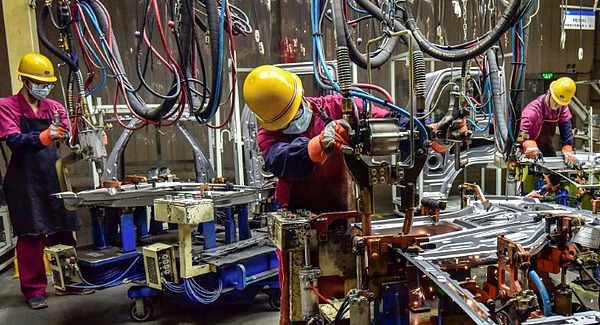By Beiyi SEOW
BEIJING, Oct 18 (AFP) — China’s economic growth slowed more than expected in the third quarter, official data showed Monday, as a crackdown on the property sector and a looming energy crisis began to bite.
After a swift coronavirus bounceback, recovery in the world’s second-biggest economy is losing steam, with gross domestic product expanding 4.9 percent on-year, said the National Bureau of Statistics (NBS), citing an “unstable and uneven” domestic rebound.
The reading was just short of the 5.0 percent tipped by analysts polled by AFP — and a sharp three percentage points off the April-June performance.
NBS spokesman Fu Linghui told reporters Monday that “current international environment uncertainties are mounting and the domestic economic recovery is still unstable and uneven.”
The economy grew only 0.2 percent from the previous three months, the weakest since a historic contraction in the first quarter last year.
“Growth was dragged down by a slowdown in real estate, amplified recently by spillover from Evergrande’s travails,” said Oxford Economics’ head of Asia economics Louis Kuijs.
The struggles of property giant China Evergrande — which is drowning in more than $300 billion of debt — has battered sentiment among prospective buyers.
A government regulatory clampdown on the real estate sector — particularly the tightening of lending rules — has dealt a severe blow to a crucial driver of economic growth, with a knock-on effect for other parts industries including construction.
Investors are now keeping a worried eye on developments in the Evergrande saga on concerns it could have an impact on the wider economy.
However, China’s central People’s Bank of China at the weekend reassured that any financial sector fallout would be controllable, while governor Yi Gang told a seminar Sunday that authorities were watching for problems like default risks “due to mismanagement and breakneck expansion” at some firms.
In a sign of the ongoing weakness in the property market, home sales by value slumped 16.9 percent on-year last month, following a 19.7 percent fall in August, AFP calculations based on official data showed.
Kuijs noted there was an “additional hit in September” from electricity shortages and production cuts caused by the strict implementation of climate and safety targets by local governments.
The added damage, he said, was visible in weaker industrial output, which slowed to 3.1 percent on-year.
“The weak third quarter GDP print reflected a combination of negative factors,” said Rajiv Biswas, Asia-Pacific chief economist at IHS Markit, including supply chain disruptions.

Investor sentiment collapse
Analysts at Fidelity International said that while property fears were the “epicenter of the shock”, economic drag was being exacerbated by the power crunch, regional lockdowns and a “zero Covid” strategy that hit the services sector and disposable income.
“The only surprise in China’s published GDP figures is that they have not come in lower,” said Paras Anand, Fidelity’s Asia-Pacific chief investment officer.
“Policy actions have been swift and have led to a collapse in global investor sentiment,” he said, though adding tightening measures have likely peaked for now.
Kuijs believed that although electricity shortages and production cuts will be controlled in the fourth quarter, “the pending real estate downturn will continue to weigh substantially on growth”.
GDP is still expected to grow around eight percent for the whole year, PBoC governor Yi added.
The weak figure has added to speculation that officials will announce a cut in the amount of cash banks must keep in reserve, providing liquidity to the financial system, but they have to walk a fine line between supporting growth and keeping a lid on inflation.
But there were some bright spots, with retail sales rising 4.4 percent — up from 2.5 percent in August — as virus containment measures were eased in the country, which has imposed swift local lockdowns over a handful of cases.
And the urban unemployment rate dipped slightly at 4.9 percent.
Anxious officials have been concerned that unemployment could cause social unrest after the figure hit a five-year high in February last year.
ADVERTISEMENT
ADVERTISEMENT








































